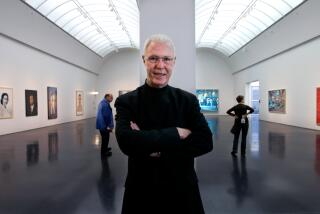Billy Tidwell; Aided Watts After ’65 Riots
- Share via
Billy J. Tidwell, a policy expert for the National Urban League who helped found two pivotal organizations in the wake of the 1965 Watts riots, died Saturday of a heart attack at his home in Silver Spring, Md. He was 58.
Tidwell was a founder of the Watts Summer Festival, the first and oldest African American cultural festival, now in its 35th year. He also helped organize the Sons of Watts, a pioneering employment training program.
Born in Tyler, Texas, to a family of eight children, Tidwell moved to Los Angeles and attended Jordan High School in Watts. He had recently graduated from UC Berkeley when the riots erupted in the summer of 1965 and he decided to help rebuild his community.
Along with attorney Stan Sanders and other Jordan High alumni, Tidwell came up with the idea of a family-oriented festival that would generate positive energy in a community that had exploded in deadly anger. Thirty-four people died and more than 1,000 were injured.
“The idea came about as an alternative to another long, hot summer after 1965. They wanted to redirect the energy of the youth of the community,” said Tommy Jacquette, who has been the festival’s executive director for 34 years.
The inaugural festival was held at the Coliseum and attracted many of the era’s top black performers, including Nancy Wilson, Hugh Masekela and O.C. Smith. Over the next several years, almost every major black artist performed at the festival, from James Brown and Isaac Hayes to Smokey Robinson and Stevie Wonder.
As chairman of the festival, the soft-spoken Tidwell was involved in every aspect of planning. He was ideal for the job, Jacquette said, because he came from the community and was respected.
Tidwell also was instrumental in starting the Sons of Watts, which attracted private sector and government grants to provide jobs and training. It began modestly, providing crossing guards and cleanup crews, gradually expanding to more ambitious programs, including family services and counseling.
Tidwell returned to UC Berkeley to obtain a master’s degree in social work in 1966. He earned a doctorate in social welfare from the University of Wisconsin at Madison in 1977.
He spent the next several years as a researcher for two groups--the Gary Income Maintenance Experiment in Gary, Ind., and Mathematica Policy Resarch in Princeton, N.J.
In 1984 he joined the National Urban League, where he developed its State of Black America reports, scholarly papers by noted policy researchers and social thinkers.
He authored many reports on the socioeconomic condition of African Americans, including “Playing to Win,” which called for a Marshall Plan for America to direct $50 billion a year into domestic priorities.
Although he left Los Angeles in the late 1960s, he stayed in touch with the neighborhoods where he grew up and expressed dismay at how much work still needed to be done.
“One of the great overriding emotions [I have],” he said shortly after the 1992 Los Angeles riots, “is the absolute anger that a generation removed from 1965, we should be faced with the same set of circumstances that undergirded the 1965 riots, that there should still be vacant lots that stand as grotesque evidence of the failure to redevelop.”
Tidwell is survived by his wife, Jean; two children, Djenada and Moriba; his mother, Verdalia; and seven brothers and sisters.
A funeral service will be held at 10 a.m. today at the Tabernacle of Faith Missionary Baptist Church, 11328 S. Central Ave., Los Angeles.
More to Read
The biggest entertainment stories
Get our big stories about Hollywood, film, television, music, arts, culture and more right in your inbox as soon as they publish.
You may occasionally receive promotional content from the Los Angeles Times.











